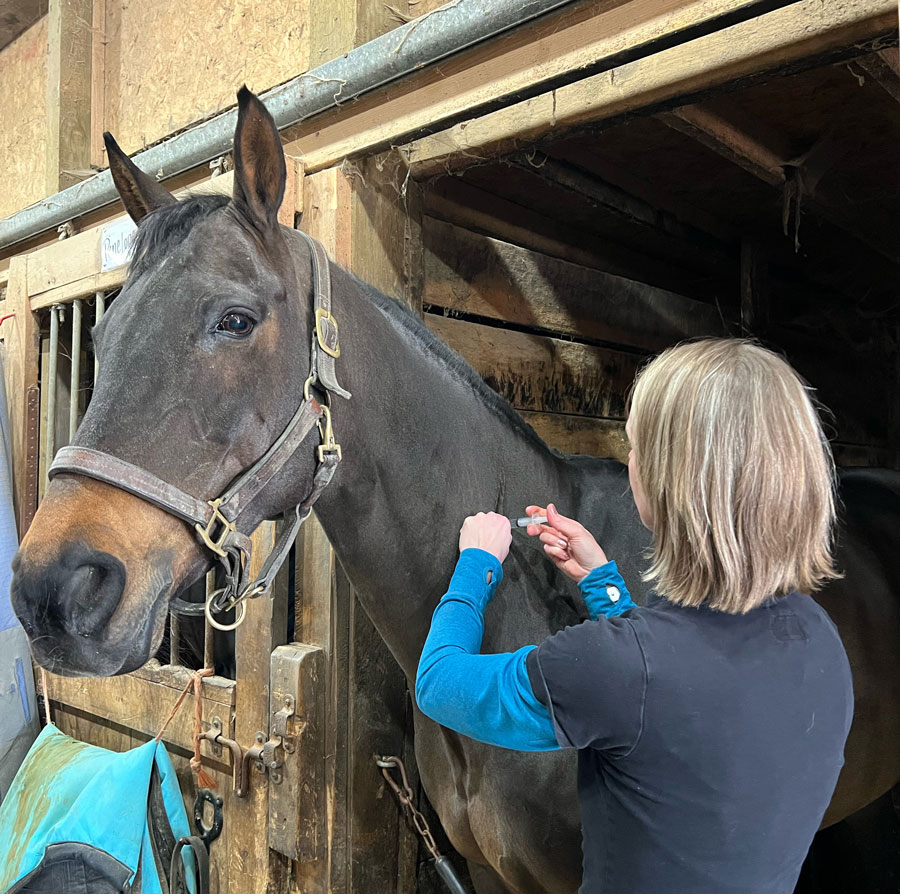WELLINGTON COUNTY – As the warming climate changes local weather conditions, horses in Wellington County are facing different viruses and infections than they did in the past.
Dr. Emma Webster of Drayton has been working as an equine vet with Heartland Veterinary Services for about 16 years. She describes climate change’s impact on equine health as a “slow, insidious change.
“Just as climate change is a trend that you see over decades, we are probably seeing that same shift happening for our horses as well,” she said.
The biggest shift Webster has seen is with mosquito-borne diseases.
“With climate change, you see different populations of mosquitoes and other carrier insects in areas of southern Ontario that didn’t used to be at risk, because of longer seasons and warming temperatures,” she said.
West Nile virus
Webster said migrating birds, particularly crows and jays, carry viruses including West Nile virus from the south. Mosquitoes contract the virus by biting the birds, and then pass it along to horses through bites.
Most horses who contract West Nile virus from infected mosquitoes are asymptomatic.
However, about 20 per cent of infected horses become sick, and Webster said of those, an average of about one third die.
She said the West Nile virus vaccine has been recommended throughout her career in equine veterinary medicine, but many of her clients used to opt out “because they didn’t see it as a risk.”
But that’s not the case anymore, she said.
Last year there were six reported cases of symptomatic West Nile virus in Ontario horses, according to the Ontario Ministry of Agriculture, Food and Rural Affairs (OMAFRA).
The cases occurred between August and October in Kawartha Lakes, Niagara, Simcoe, Hastings, and as far north as Thunder Bay.
Symptoms included fever, colic, drooling, twitching, depression, uncoordination, seizures, and an inability to stand.
All six of the horses were unvaccinated against West Nile virus, and at least three died, according to OMAFRA.
Webster said she has seen the virus “fluctuate over the years.
“It was first identified in Canada in 2001, and even that is relatively recent past. Prior to that, it was not something people were worried about. But it came to Canada and became endemic – it’s here to stay now.”
She recommends horses get vaccinated against West Nile virus every spring, so they’re best protected in late summer and fall, when mosquitoes are most likely to be carrying the virus.
Equine encephalitis
Equine encephalitis is another virus carried by mosquitoes, and this one is even more deadly.
Webster said veterinarians are seeing “a lot more” equine encephalitis locally.
Heartland Veterinary Services did not vaccinate against equine encephalitis 16 years ago, she said, but now it’s part of its core vaccine program.
Last year, OMAFRA reported 18 cases of equine encephalitis, and all but one of the horses died – many within 24 hours of the onset of symptoms. All were unvaccinated or under-vaccinated.
Equine encephalitis causes brain inflammation, and horses showed a range of neurological symptoms including uncoordination, lethargy, fever, seizures, inability to stand, and blindness.
The cases were all reported between July and October in Muskoka, Peterborough, Kawartha Lakes, Ottawa, Leeds and Grenville, and Lanark.
In 2022, OMAFRA did not report any cases of equine encephalitis, and in 2021 it reported four.
Potomac horse fever
Webster said another growing concern for local horses’ health is Potomac horse fever.
Horses pick up the infection by accidently eating freshwater snails, dragon flies, or damsel flies carrying rickettsia, an organism that causes Potomac horse fever, she said.
With wet weather and more standing water in fields, horses are at higher risk of being exposed to snails and aquatic insects carrying the organism, she said.
Potomac horse fever was first identified in Maryland, and has “worked its way up the Eastern coast to Ontario,” Webster said, particularly Ottawa, which she describes as a “bit of a hotbed.
“When I graduated we didn’t see cases of Potomac horse fever here,” she said. Though she’s rarely seen it herself, Webster said the Ontario Veterinary College at the University of Guelph “has definitely seen cases in the last couple of years, so it’s definitely in Wellington County.”
Potomac horse fever symptoms include depression, loss of appetite, fever, diarrhea and colic.
Heartland Veterinary Services has not yet included the Potomac horse fever vaccine as one of its core vaccines because although a vaccine does exist, its not the most effective, Webster said.
“But I could totally foresee a future where this does become part of our core, if this does become an endemic disease that we are seeing more regularly.”




